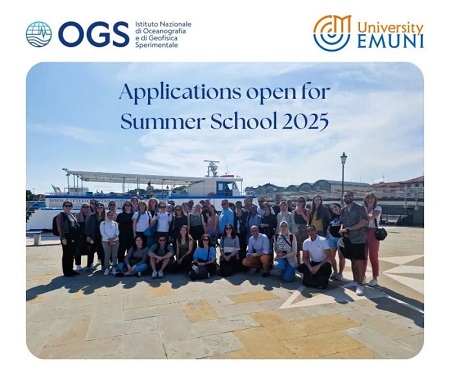
Register with Plumtri!
Register on plumtri as an Individual or as an Organisation to gain access to all of its useful features and remain updated on the latest R&I news, events and funding opportunities.
-
 Welcome to plumtriA platform for Research & Innovation
Welcome to plumtriA platform for Research & Innovation -
 Looking for Funding?Check out the current open calls
Looking for Funding?Check out the current open calls -
 Register today to start receiving our monthly newsletter
Register today to start receiving our monthly newsletter -
 Looking to partner up?Search our list of registered profiles
Looking to partner up?Search our list of registered profiles -
 You have questions on a particular funding programme?
You have questions on a particular funding programme?
Blue Skills: Summer School 2025
In the context of the ecological transition and digital transformation, there are several opportunities in the blue economy sectors in the Mediterranean. Local governments should take advantage and raise awareness of such potential and work more closely with the industry and the private sectors to develop more innovative models to maximize job opportunities. Thus ensuring the sustainability of the blue economy sectors, moving towards a circular economy and protecting biodiversity and ecosystems while increasing income and developing local economies.
In particular, our oceans are facing multiple challenges: while already dealing with climate change, pollution and biodiversity loss, an increasing number of countries are willing to invest in their ocean economies. In this sense, acquiring knowledge on how to preserve the health and wellbeing of our oceans plays a key role in ensuring the sustainable development of ocean-related sectors.
It is therefore crucial to equip young people with the skills and knowledge they need to meet the complex challenges of the future at different levels. From local to national to regional levels.
The summer school is focused on Ocean and Climate: Building Capacity and Developing Skills for a Sustainable Blue Economy. It covers multidisciplinary fields related to the marine and maritime sectors, providing both theoretical insights, practical applications and technological trends.
Particular emphasis will be given to the context of the Euro-Mediterranean Region and to ocean monitoring and forecasting, marine policy implementation, and marine environment management, which are all essential to make informed decisions, also through the use of the Copernicus Marine Service.
In addition, the summer school strengthens scientific dialogue and cooperation through the instrument of science diplomacy, by promoting partnerships and networking amongst individuals, institutions and countries for the benefit of the whole region.
It is organised within the framework of the Western Mediterranean Forum, the 5+5 Dialogue for research, innovation and higher education, with the aim to train young researchers and promising talents from the five EU Member States (France, Italy, Malta, Portugal and Spain) and the five Arab Maghreb countries (Algeria, Mauritania, Morocco, Libya and Tunisia).
Specific objectives of the summer school are:
- Deepening the scientific knowledge on the connection between Ocean and Climate though data acquisition and processes; models development; decision making based on data and models, also by familiarizing with the Copernicus Marine Service as a tool to foster Sustainable Blue Economy
- Identifying relevant soft and transversal blue skills needed by the labour market: adapting to new labour market skills needs;
- Identifying and addressing skills gaps by working closely with the private sector to promote innovation;
- Reskilling and up-skilling young talents with methodological approach and innovative tools to help developing sustainable blue economy and ocean governance in the Mediterranean region;
- Exposing trainees on necessary skill sets, considering the challenges and the opportunities of the twin green and digital transition for the sustainable blue economy;
- Strengthening science diplomacy through partnerships and cooperation in order to plan joint activities and projects at regional level.
Dates: 10-17 June
Application deadline: 28 February 11.59 PM (CET)
Target candidates
The Summer School targets participants from the Euro-Mediterranean Region. Participants must fulfil the following requirements:
- Enrolled in a master’s degree program or holding a master’s degree, a PhD candidate or holding a PhD
- Knowledge of English (level B2 or higher)
- A demonstrated interest in the Mediterranean region and the theme of sustainable blue economy.
Preferred fields of expertise: oceanography (physics, chemistry and biology), marine biology, geology, geophysics, geochemistry, environmental engineering, ecological modelling, climate study, coastal zone management.
30 participants will be selected to participate in the Summer School in Trieste and Piran.
During the selection process, an attempt will be made to ensure the geographic distribution and diversity, gender balance and participation of young researchers.
Visit the below link to read further.

